NYSACTE, Advance CTE, and ECMC Foundation are excited to introduce the Fellows of the inaugural cohort of emerging leaders from across New York State. The Fellows of the NYSACTE Postsecondary State Career Technical Education (CTE) Leaders Fellowship at Advance CTE—Sponsored by ECMC Foundation include representation across multiple demographic categories reflecting the Fellowship’s goal of intentionally building a postsecondary leadership pipeline for underserved populations in CTE that closes racial representation gaps and removes equity barriers to postsecondary leadership advancement. This final blog in the series introduces the remaining five NYSACTE Fellows.
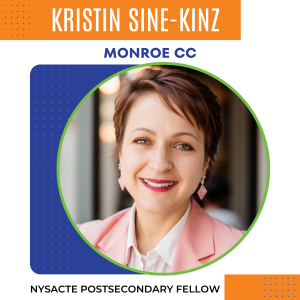 Kristin Sine-Kinz, MBA, serves as the chief of staff and strategic marketing team leader for the Division of Economic & Workforce Development & Career Technical Education at Monroe Community College (MCC). Ms. Sine-Kinz has a rich background in professional services, having crafted business and marketing strategies for major brands like Motorola, Fisher Price, Kodak, and Honeywell. At MCC, Ms. Sine-Kinz reports to the division Vice President, and is deeply involved in strategic projects and initiatives, both college-wide and within her division. Her extensive 27-year career includes nearly 13 years at MCC, and a stint as the MCC Interim Vice President for Economic & Workforce Development & Career Technical Education. She holds an MBA from Western Governors University and a Bachelor of Fine Arts from the Rochester Institute of Technology.
Kristin Sine-Kinz, MBA, serves as the chief of staff and strategic marketing team leader for the Division of Economic & Workforce Development & Career Technical Education at Monroe Community College (MCC). Ms. Sine-Kinz has a rich background in professional services, having crafted business and marketing strategies for major brands like Motorola, Fisher Price, Kodak, and Honeywell. At MCC, Ms. Sine-Kinz reports to the division Vice President, and is deeply involved in strategic projects and initiatives, both college-wide and within her division. Her extensive 27-year career includes nearly 13 years at MCC, and a stint as the MCC Interim Vice President for Economic & Workforce Development & Career Technical Education. She holds an MBA from Western Governors University and a Bachelor of Fine Arts from the Rochester Institute of Technology.
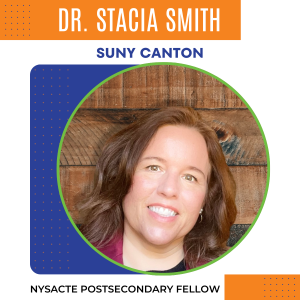 Dr. Stacia Smith is an assistant professor in the Decision and Graphic Media Systems Department at SUNY Canton. She has been teaching computing and technology courses since 2009. Dr. Smith spent 12 years as the principal investigator for the Collegiate Science and Technology Entry Program (CSTEP), a New York State grant-funded program. In this position, Dr. Smith provided education assistance and academic enrichment services to minorities and economically disadvantaged students pursuing careers in STEM, health, or a licensed profession. She currently serves as chair of the Women in Engineering committee and is a member of the campus’s Affirmative Action committee. Dr. Smith is an experienced grant writer; she has secured over one million dollars in funding for her campus. Dr. Smith has a doctorate degree from Purdue University, a master’s degree from SUNY Potsdam, and a bachelor’s and associate degrees from SUNY Canton.
Dr. Stacia Smith is an assistant professor in the Decision and Graphic Media Systems Department at SUNY Canton. She has been teaching computing and technology courses since 2009. Dr. Smith spent 12 years as the principal investigator for the Collegiate Science and Technology Entry Program (CSTEP), a New York State grant-funded program. In this position, Dr. Smith provided education assistance and academic enrichment services to minorities and economically disadvantaged students pursuing careers in STEM, health, or a licensed profession. She currently serves as chair of the Women in Engineering committee and is a member of the campus’s Affirmative Action committee. Dr. Smith is an experienced grant writer; she has secured over one million dollars in funding for her campus. Dr. Smith has a doctorate degree from Purdue University, a master’s degree from SUNY Potsdam, and a bachelor’s and associate degrees from SUNY Canton.
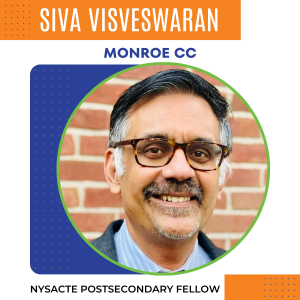 Siva Visveswaran serves as director of the Finger Lakes Workforce Development Center (FWD), which helps to drive the operations strategy and implementation of accelerated training programs and career exploration opportunities in the areas of Advanced Manufacturing, Skilled Trades, and IT. Through innovative partnerships across area employers, economic development nonprofits, community-based organizations and local colleges and schools, the FWD center aims to address critical skill gaps and labor shortages for the Finger Lakes region.
Siva Visveswaran serves as director of the Finger Lakes Workforce Development Center (FWD), which helps to drive the operations strategy and implementation of accelerated training programs and career exploration opportunities in the areas of Advanced Manufacturing, Skilled Trades, and IT. Through innovative partnerships across area employers, economic development nonprofits, community-based organizations and local colleges and schools, the FWD center aims to address critical skill gaps and labor shortages for the Finger Lakes region.
Co-founding Topxight Labs LLC to incubate emerging businesses at the confluence of product design, commerce, machine learning, and data sciences. With a special focus in FinTech and EdTech and technology adoption in emerging markets. Responsible for defining Topxight’s thematic focus areas, its proprietary start-up incubation methodology called Survey-To-Scale, technology strategy for portfolio companies, industry and academia engagement, IP creation and authoring position papers. Companies incubated include: Alphabeta, Manoké, Cythereal, L4S, FlyBy, and GreenCoin.
More than 25 years of experience in the IT industry as software developer, system engineer, enterprise architect and IT strategy consultant. Strengths & experience in incubating emerging technology organizations, developing business aligned IT strategies and building strong software engineering teams.
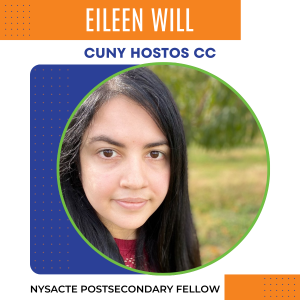 Eileen Will holds a Master of Public Administration (MPA) from Baruch College and a Bachelor of Arts (BA) from City College. She is currently in her third year as Perkins director at Hostos Community College in the South Bronx, where she is dedicated to advancing the success of students in Career and Technical Education (CTE) programs.
Eileen Will holds a Master of Public Administration (MPA) from Baruch College and a Bachelor of Arts (BA) from City College. She is currently in her third year as Perkins director at Hostos Community College in the South Bronx, where she is dedicated to advancing the success of students in Career and Technical Education (CTE) programs.
Eileen’s career began in social services, working with special populations, and has evolved into a strong focus on program development and community outreach. She has built a solid foundation in creating impactful initiatives that enhance access to education and resources.
Passionate about fostering pathways to success for CTE students, Eileen is committed to improving opportunities for all learners. She was honored with the Hostos Community College Manos a la Obra Award in 2023 for her outstanding management of the Perkins grant, and in 2024, she was selected for the ACTE NextLevel Postsecondary CTE Leadership Program.
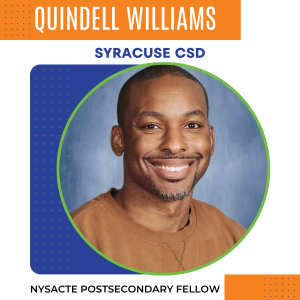 Quindell Williams is currently the workforce talent and development coach for the Career and Technical Education Department, in the Syracuse City School District. Prior to this role, Quindell spent a few years teaching the PTECH Remotely Piloted Aircraft Systems (RPAS) program to high school students. Through his passion for mentorship and drone technology, Quindell has enjoyed helping students reach their potential in the classroom.
Quindell Williams is currently the workforce talent and development coach for the Career and Technical Education Department, in the Syracuse City School District. Prior to this role, Quindell spent a few years teaching the PTECH Remotely Piloted Aircraft Systems (RPAS) program to high school students. Through his passion for mentorship and drone technology, Quindell has enjoyed helping students reach their potential in the classroom.
Before becoming an Educator in CTE, Quindell spent nearly 10 years in Broadcast Television at CNY Central in Syracuse, as a videographer and drone pilot. He is a proud graduate of Onondaga Community College and SUNY Oswego.
To learn more about the NYSACTE Fellowship please visit https://www.acteonline.org/nysacte/nysacte-postsecondary-fellowship/.


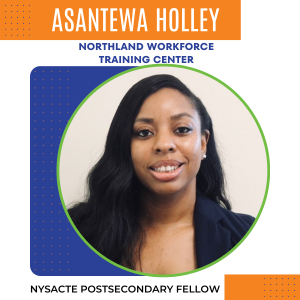 Asantewa K. Holley
Asantewa K. Holley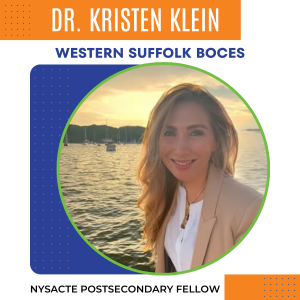 Dr. Kristen Klein
Dr. Kristen Klein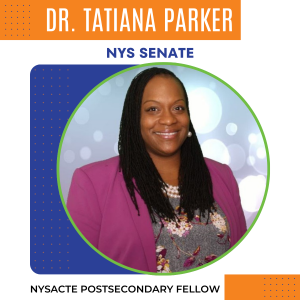 As the Director of Constituent Services and Grant Administrator for a New York State Senator in Central New York,
As the Director of Constituent Services and Grant Administrator for a New York State Senator in Central New York, 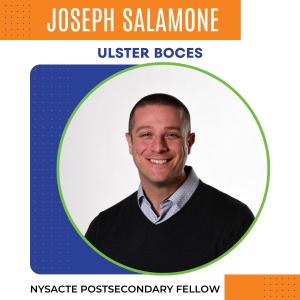 Joe Salamone
Joe Salamone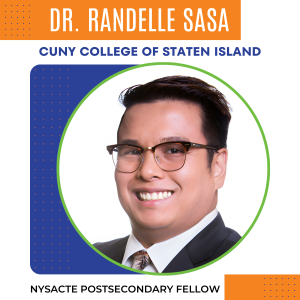 Dr. Randelle Sasa
Dr. Randelle Sasa Dana Acee
Dana Acee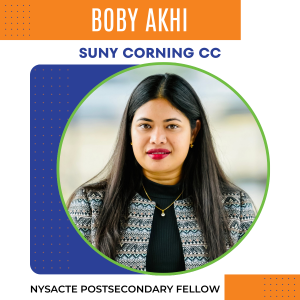 Boby Akhi
Boby Akhi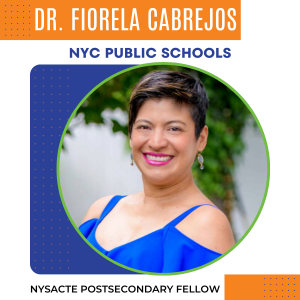 Dr. Fiorella Cabrejos
Dr. Fiorella Cabrejos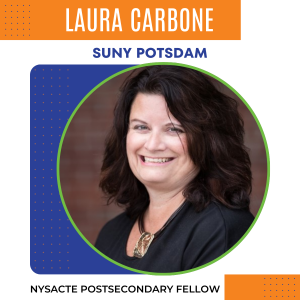 Laura Carbone
Laura Carbone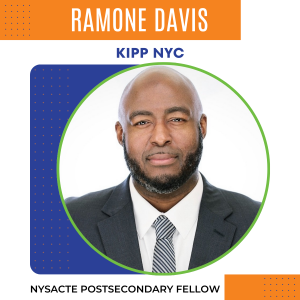 Ramone Davis
Ramone Davis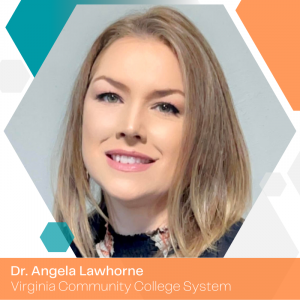 Tell me more about your journey to the Fellowship.
Tell me more about your journey to the Fellowship.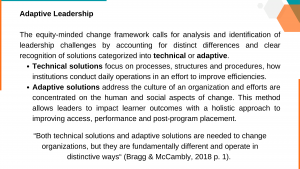
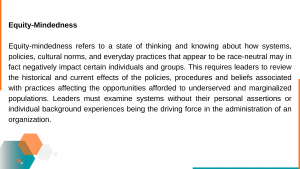
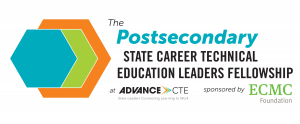
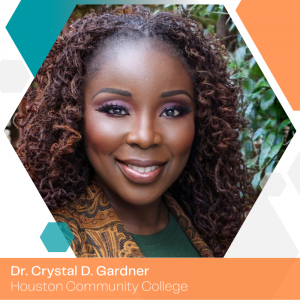 Dr. Crystal Gardner currently serves as the Instructional Supervisor for the Houston Community College (HCC) Alternative Teacher Certification Program (ATCP). In this role, she oversees instructional operations, program development, quality control, and compliance management. Joining the Fellowship was an exciting opportunity to fully immerse herself in the world of career and technical education (CTE) through equity-aligned learning and real-world practicum.
Dr. Crystal Gardner currently serves as the Instructional Supervisor for the Houston Community College (HCC) Alternative Teacher Certification Program (ATCP). In this role, she oversees instructional operations, program development, quality control, and compliance management. Joining the Fellowship was an exciting opportunity to fully immerse herself in the world of career and technical education (CTE) through equity-aligned learning and real-world practicum. “When our passion fuels our purpose, we will always blossom where we have been planted and do great work as servant leaders.”
“When our passion fuels our purpose, we will always blossom where we have been planted and do great work as servant leaders.” “As a lifelong learner, I’ve always been intentional in my pursuit of professional development and growth in my career.”
“As a lifelong learner, I’ve always been intentional in my pursuit of professional development and growth in my career.”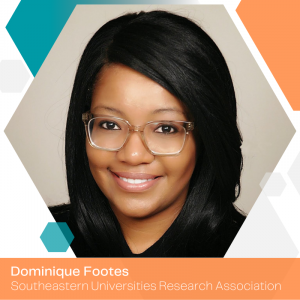 Tell me more about your journey to the Fellowship.
Tell me more about your journey to the Fellowship.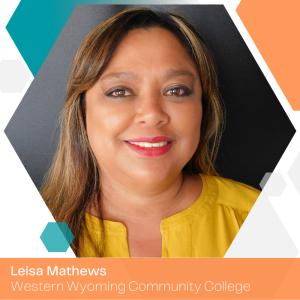 Tell us about your journey to the Fellowship.
Tell us about your journey to the Fellowship.